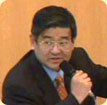 Ono: To be fearless in innovation, you will need to be ready to abandon what you have now. Please take a look at this illustration (*image 7). Teigo Iba, whom I look up to, said, “When you do something new, it takes consideration, prayer, abundance and determination.” I think that these are the keywords in a time of innovation. “Consideration” means to think your idea through thoroughly, with logic, until you can find no holes in it. “Prayer” means that happiness and unhappiness, good and bad cannot be judged only with logic; that our world consists of more than just logic and needs human prayer. These two words are the essence of growing strong roots in our lives. The center of the illustration is the tree’s roots. In my opinion, a trunk can be cut down as long as life, the roots, remains. Even if an old tree is cut down, it is not the end of the life of the tree if the roots remain in the soil. A new shoot will grow out of the stump. Like an oak tree, it keeps growing as long as nutrition is delivered through the roots. So, if you do not think that an existing trunk, branches or leaves are proper, it is OK to cut down the whole trunk. Ono: To be fearless in innovation, you will need to be ready to abandon what you have now. Please take a look at this illustration (*image 7). Teigo Iba, whom I look up to, said, “When you do something new, it takes consideration, prayer, abundance and determination.” I think that these are the keywords in a time of innovation. “Consideration” means to think your idea through thoroughly, with logic, until you can find no holes in it. “Prayer” means that happiness and unhappiness, good and bad cannot be judged only with logic; that our world consists of more than just logic and needs human prayer. These two words are the essence of growing strong roots in our lives. The center of the illustration is the tree’s roots. In my opinion, a trunk can be cut down as long as life, the roots, remains. Even if an old tree is cut down, it is not the end of the life of the tree if the roots remain in the soil. A new shoot will grow out of the stump. Like an oak tree, it keeps growing as long as nutrition is delivered through the roots. So, if you do not think that an existing trunk, branches or leaves are proper, it is OK to cut down the whole trunk.
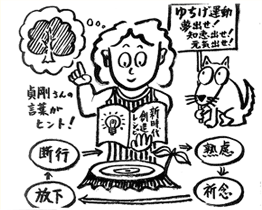
image 7
|
Space development is the same. If the concept of a conventional space transportation system or satellites seems to be old-fashioned, I think that we should discontinue the system and try a new idea. I believe that a new shoot will grow as long as there is passion there. Allow me to conclude with a suggestion that we think about new approaches to space for the new era, bearing in mind the words “consideration,” “prayer,” “abundance,” and “determination.”
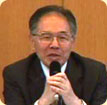 Akiba: In the 21st century, I hope that space becomes an accessible place to all. “Reachable space” - this is all I would like to say. Akiba: In the 21st century, I hope that space becomes an accessible place to all. “Reachable space” - this is all I would like to say.
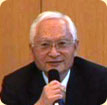 Tachikawa: We humans have the desire for progress and new challenges. I would like to actualize our desires. There are times when we make great strides, but I’m inclined to say that it only happens once every 50 years. As such, we might be able to expect a big leap around the middle of the century. I have great expectations for today’s young people. Tachikawa: We humans have the desire for progress and new challenges. I would like to actualize our desires. There are times when we make great strides, but I’m inclined to say that it only happens once every 50 years. As such, we might be able to expect a big leap around the middle of the century. I have great expectations for today’s young people.
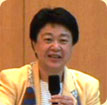 |
Mukai: Some want to make money out of space development, but it seems to me that space development has been providing us with something rather priceless. By learning what astronauts have experienced in space or looking at photos of the Earth taken from there, I think that many have gained a strong sense of our planet Earth, and the importance of passing on the planet, as the common property of all, to the next generation. I call this awareness a spiritual spin-off. It cannot be assessed based on monetary value. Once we have learned the awareness, instead of looking at space as a special place, we all should treat the universe as our mutual property, just like water and air. How can we utilize our universe for the future? It should be for the benefit of all of us. To think this way is not extraordinary; it is our responsibility to do so.
|
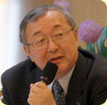 |
Matogawa: We have embarked on a new era for space development, the Earth and all humankind. The panelists have given us very important clues as to how we should act at such a time. We hope to have further discussions about this.
I am also in charge of running the JAXA Space Education Center, and what I notice every time I come to Kanazawa is people’s keenness for education. We are going to spread the essence of space all over the city during the week when ISTS is held here, so I hope that it will be your inspiration to further education. Thank you very much for your attendance. |
|

